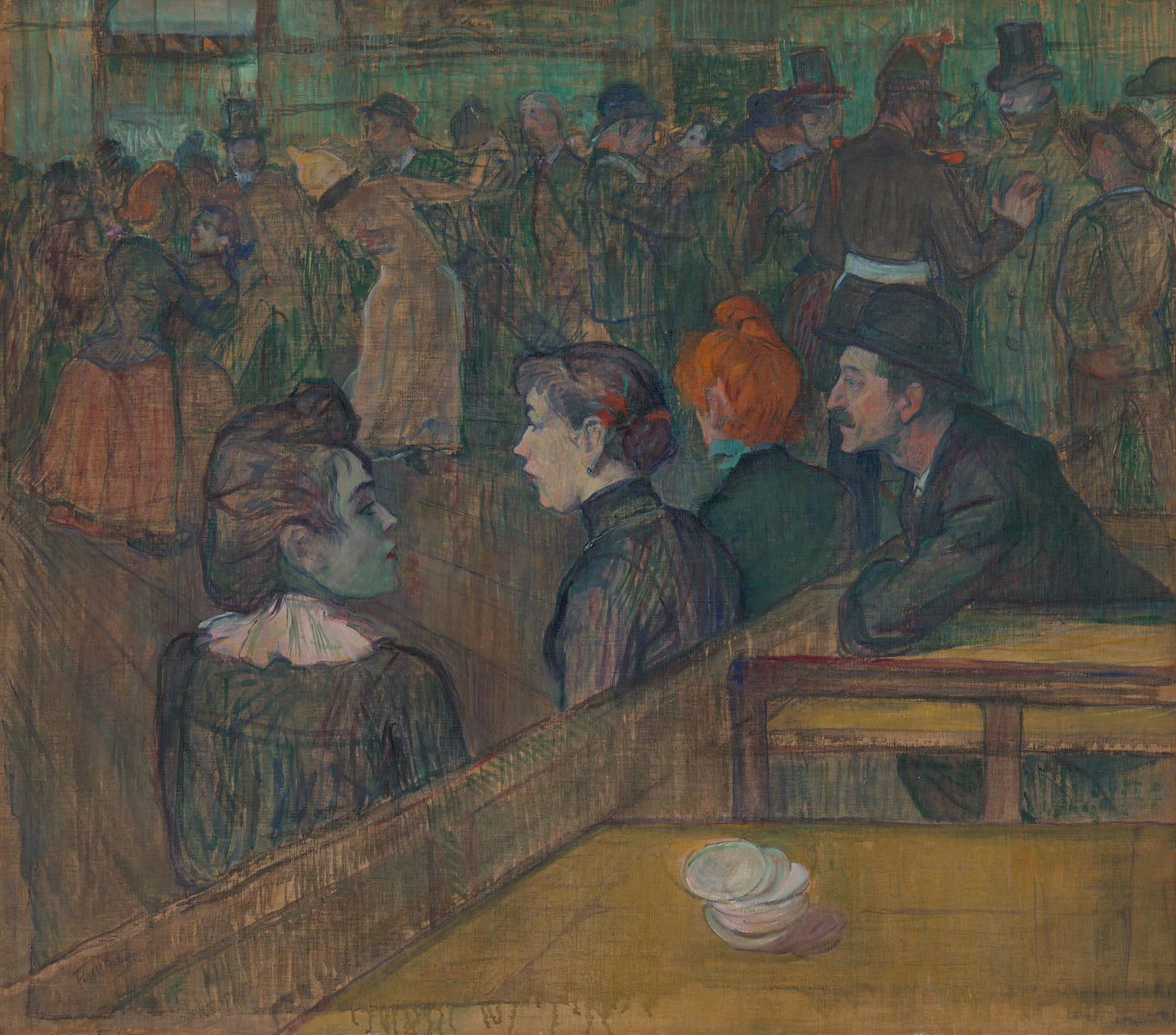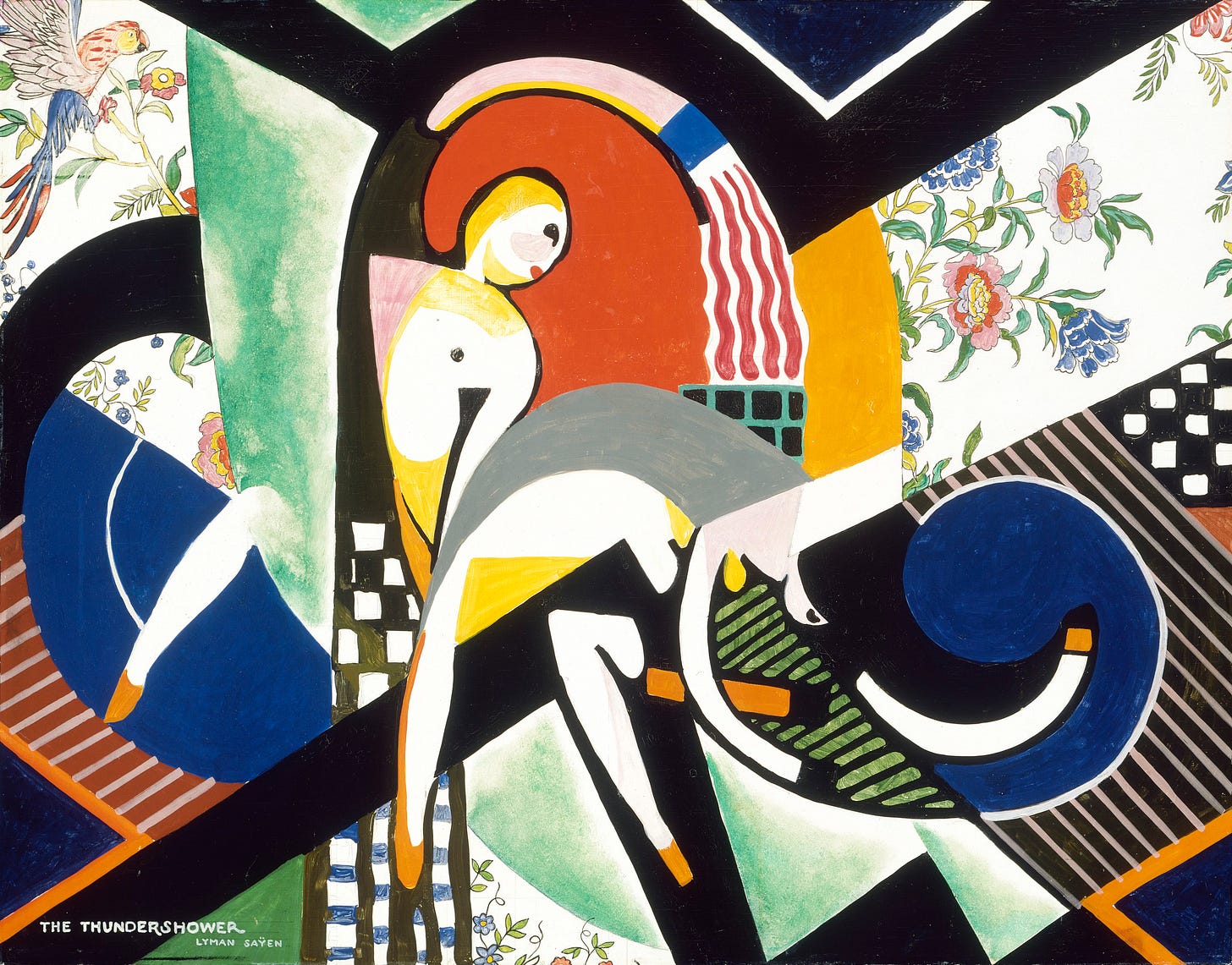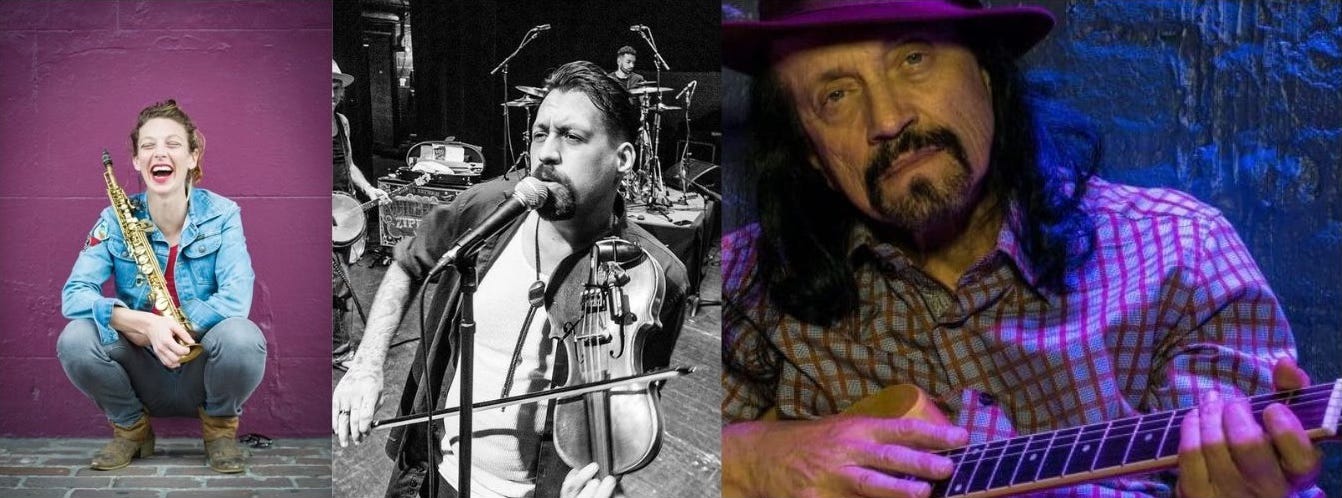At a good bar in America, you come for the booze and stay for the music. At a good bar in New Orleans, bouncers enforce a one drink minimum per set, because you might come for the music, forget yourself, and never buy a damn thing.
I’d travelled to this great city of the South in a funk. Winter always puts me in a funk, a time when prolonged darkness and cold bring out the neurotic strains of my personality and even I find myself insufferable. Such brain states feel somehow worse in beautiful places like New Orleans. Here I am walking along broad brick streets with houses painted so many sunset colors, big-limbed live oaks arching overhead, palm fronds waving in the mild gulf breezes, and all I can think about is what an embarrassment I was in ninth grade, or all the ways the compliment my husband just paid me might have been backhanded. I’m sick of listening to myself think.
There’s a word for this state of mind—and the actions that result from it—that our culture has mostly forgotten. These days we use the word “mean” as a near synonym of “unkind,” but its original definition, dating back to the Old English spoken over a thousand years ago, was more specific. It meant unkindness that arose out of emotional miserliness. A mean person hoarded sympathy the way Ebenezer Scrooge hoarded pounds sterling. In this sense, a mean person wasn’t simply unkind, they were unkind because they felt embittered, so battered and beaten by the world that they couldn’t bring themselves to spare any gentleness or generosity for their fellow men. “Mean” was unkindness that arose from lack, from the sense that one didn’t have enough comfort or happiness for themselves and thus refused to give it to anyone else.
I am not a cruel person. I am not vengeful. I do not wish others ill. But I am, especially when these funks find me, a little bit mean.
Getting out of this state is always a riddle. The obvious answer of “Well, Annie, just don’t do that; don’t say that sarcastic thing; don’t verbally snipe at those you love,” has never quite worked. Such internal admonitions often send me into a spiral of shame, increasing my inner ache until I go from stony and acidic to pleading and tearful—not pleasant for those who were fielding my barbs mere hours before. The brute-force discipline of “just do it” has never been my strong suit. My life is anything but a Nike ad.
An alternative method is that oft proclaimed cure-all, that phrase bloated past all meaning by the Instagram-industrial complex: “self care.” Feeling empty inside? Buy a croissant. Take a bath. Get a manicure. Have some wine. I’m not saying an hour alone with a book in some quiet, sunny room has never done me good. It has and will. But generally when I get to the point that I’m scowling at my husband and annoyed by the charm of the live oaks, I’m beyond the help of such methods. I also recoil slightly at the formulation “if you are being grumpy at your children, then go buy yourself a latte.” Such indulgence of bad behavior sits ill with me.
So what to do with my mopey self, wandering full of self pity beneath the cypress trees?
Our third night in New Orleans, my husband and I found our way to Frenchman Street. It’s the musical heart of the city: three scant blocks that hold a series of clubs and restaurants where on any given night you can find jazz, blues, and doo-wop in several styles and flavors. We wandered a little—grabbing dinner, having a few drinks—before we finally wound up at The Spotted Cat.
To my mind, live jazz isn’t something you sit and listen to, which was fine because The Spotted Cat had maybe ten chairs in the whole place. On stage was Aurora Nealand and her group the Reed Minders, though I didn’t know that at the time. I just saw a sparrow-boned brunette drawing such sounds from her soprano saxophone that my chin tipped toward the ceiling and my feet rooted to the floor. Wrapped in that melody, my body felt languorous and heavy, not heavy like shackles but heavy like honey sinking to the bottom of a glass, heavy like a rose blossom bending under its own weight. Heavy like why would you want to be anywhere but here?
Most people at The Spotted Cat—and most of the clubs we visited that night—weren’t dancing exactly. We were swaying like trees in a welcome thunderstorm rolling in after drought. We were rocking like infants in a soft cradle. In such ways did the jazz of Frenchman Street enter the body. Even before the second drink hit, even before Nealand took her first solo, my conscious self was not at the helm.
This magic of live music is not just that it’s beautiful. At its best, it’s a form of deep intimacy offered unconditionally by a total stranger. Nealand was up there pouring her soul into that saxophone. I stood, one dark face in a crowd, and swayed to her rhythms. You can drink such intimacy irresponsibly and with no strings attached. It comes with no baggage, no stale fights to tiptoe around, no old wounds ready to reopen. At any given moment, I could have walked out of the bar and disappeared into the night. Nealand and her fellow players wanted nothing from me except that I joyfully experience their music: the perfect salve for a hurting, sarcastic soul who needs more but already knows she’s asked too much. Live music—like so much art—is an outpouring that asks nothing in return. It is perhaps the last unconditional intimacy available to misers like me. I went back to Frenchman Street the next night. If the world would let me, I’d still be there.
On that final evening, the rain pounded hard over the city as my husband and I wandered back to our little, rented bungalow. As I climbed into bed, two neighborhood strays yowled and fought each other in the neighboring alley. An ambulance wailed down Esplanade Street to the west, and off east, a train whistle traced its long cry across the night. Lying in the dark listening to the downpour, I heard somewhere out there—maybe on a porch or through an open window—a single trumpet unspool a long, quivering note. It wavered a moment, soared high, then faded. Miser that I am, the city offered itself to me: in water, and sirens, and the freely-given melody of human feeling.
Some amazing music I heard in New Orleans:
Here’s the link to Aurora Nealand’s music and her multiple projects. Let it keep you company on some night when your heart needs more than it can reasonably ask. Especially if you like jazz that tilts a little toward the strange, the atmospheric, and the experimental, Nealand’s stuff is for you.
This was the second act we heard at The Spotted Cat that night and arguably my favorite. I didn’t know I needed jazz fiddle in my life until I heard Dr. Sick pull it off with such panache. If you like music that is also a comedy act, music that’s all big-brass showmanship that verges on camp, give this a listen.
At a tiny bar called The Apple Barrel (packed, standing-room-only it held maybe 20 people), we heard this amazing blues artist named Jeff Chaz. We walked in because as he was tuning up his base, one fan standing in the street stopped us and said, “Wait, listen. This guy is serious. I’ve been following him for years.” We took his word for it and got to experience without a doubt the best blues I’ve ever heard.






